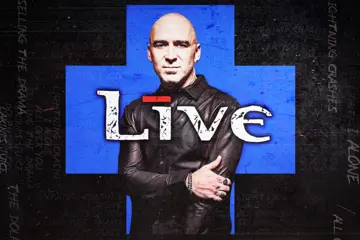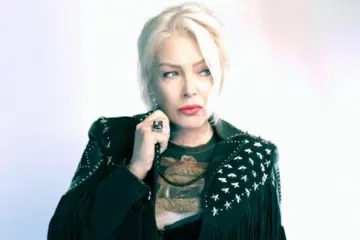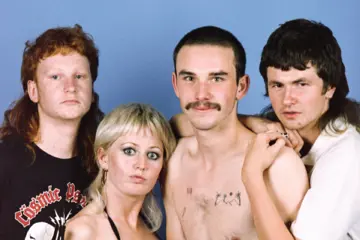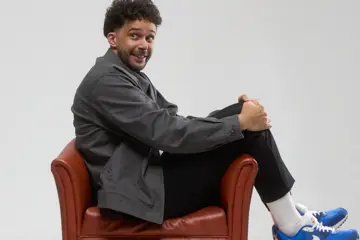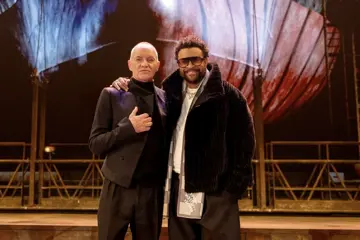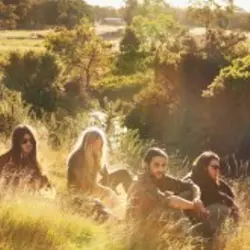 Redcoats
RedcoatsEn route to a video reshoot, three quarters of Redcoats wander through the pub's side bistro door, all long hair and the right amount dishevelled-looking. A hat containing all the essentials – sunnies, keys and stuff – is thrown onto the floor under the table. Drummer Andrew Braidner and bassist Rhys Kelly favour multiple cokes, while frontman Emilio Mercuri – still in his work attire of navy, paint-stained overalls – is up for some beers. Kelly politely (and regularly) excuses himself thoughout the course of our lengthy chat to attend to phone calls and smoke suspicious-looking rollies. Just over a year after the band released their debut self-titled EP, comes their debut, self-titled full-length. The names of both releases are the same, but Mercuri observes, “A lot of things changed between the EP and the album”. Kelly concurs, “That's true. And how many shows came up in that year, in that 12 months?”
“We were putting out the EP on our own,” Braidner continues, “and then record labels sort of came and bought it and then, [for] the album, we were with the record label.” Mercuri reflects, “We were in different mindsets, obviously. We'd spent a lot of time compiling songs for the album and, you know, in hindsight it may have been a lot longer than what we'll do for other albums, but I think at the time it was really good to get quite a big mound of songs that even now we can go back into. We've kind of safeguarded ourselves with material for the time being, so if the well is running a little bit dry at some point – and, touch wood, it never does – we have the shelves moderately filled at the moment, which is great. But I think we were a lot younger as well with the EP.”
Mercuri tells that Redcoats “usually go away or stick themselves in the Bakehouse [Studios] for a week, or try to get up to the Grampians for a couple of weeks” to isolate themselves and get to work songwriting. “We usually just save our money that we earn as a band and use it to [go away to] write, which has worked really well for us over the last couple of years.” Although the band account doesn't require all four signatures, the singer points out, “We haven't had any issues with it yet, so it's pretty cool.”
Each Redcoat has his own favourite track on the album and Braidner shares, “We generally never all four of us agree on the one thing, which is great. In terms of artwork and singles: everyone's always three against one, two against two – however it is – which is good.” Mercuri agrees: “It definitely evokes conversation in terms of everything, which is perfect.”
“It can become a real problem being a democracy, especially with even numbers,” Kelly laughs.
Don't miss a beat with our FREE daily newsletter
Sometimes even if you storm off in the middle of an 'artistic differences' stand-off, believing there's no room for compromise, a bit of space can help you process the other band member's point of view and work through a compromise though, right? Mercuri nods: “That emotional recall to certain things, as well, helps with when you go back in and start writing – as a lyricist it definitely helps, you know? You can attribute certain things to those experiences, which is pretty cool.”
The band prefer songwriting sessions as a collective, as Mercuri explains. “We'll be in there structuring and coming up with the actual basis of the song, and the framework of it and the melodies. And [we] sing some things over it whilst we're jamming and then listen back, pull those things out.” Just noises or actual words? “Sometimes noises, sometimes just stoned ramble, sometimes sober ramble, you know? Whatever's kinda coming out,” he clarifies. “Because we're all doing it together at the time, you know, it'll be a 30-minute song and then [we] play it again and play it again, over and over again, until its refined itself. And in that time I can develop that content lyrically – it's naturally come about. So that's how it usually works. Definitely go back and refine them.”
Braidner comments, “You spend hours doing your head in over that stuff, and the right word for people to latch onto.” Mercuri acknowledges, “Yep. So that seems to get me started pretty well.”
Redcoats have already garnered much respect and admiration via their live shows, but the band believe there are still many performance elements yet to be perfected, especially when it comes to slaying massive festival crowds from front row to nosebleed section. “It's a bit of an ancient trade, being able to get 10,000 people involved in a set,” Mercuri remarks. “A lot of different things come into it, for sure.”
“Well we haven't figured it out,” Braidner admits. “But we're having a lot of fun figuring it out.” If the magic ingredients for holding a festival crowd captive, night after night, had already been sourced and documented, Kelly suggests, “You'd be bored, man.”
“I guess initially, for me, we placed a big emphasis on forming a connection between each other onstage,” Mercuri ruminates, “and we were always under the impression – oh well, I was anyway – that if we managed to keep that quite strong throughout the whole set, then in turn the crowd would respond to that. I think, though, on stages that are a little bit bigger and perhaps festival stages and stuff like that, it is a little bit more difficult to have such a close encounter with a crowd, so you have to learn to develop that connection onstage.”
“Project it forward,” Braidner suggests. Mercuri ponders, “Yeah some sort of – I dunno, it needs to have a different type of velocity.” Braidner interjects, “That pushes over the crowd,” which seems to satisfy Mercuri, who completes his bandmate's sentence, “Which we're still learning how to do. And just seeing others bands more developed – not so much more developed, just more experienced – do it, and just how still they are in that moment on a festival stage or something… We need to be moving when we're onstage, it's just something we have to do.
“It definitely comes back to – well, I think anyhow – it just comes back to people being saturated with things that they know, and those more experienced bands have obviously had more time to allow a crowd their music through different forums. So once they're at that point and [the crowd] recognise something that they know and that they're used to, and it's not so much something that is different for them, they will respond more eagerly. And I think we're definitely building that relationship with people that are coming to these shows now. The small pocket in the right back corner is genuinely growing into something a bit bigger.” All three present Redcoats laugh.
“I think we're trying to consolidate things a bit at the moment rather than look too far forward,” Braidner summarises, “just keep writing for the next album and do a good tour for this album, and do it justice and keep building on what we've done so far with getting people interested.”
Redcoats will be playing the following shows:
Thursday 8 November - Karova Lounge, Ballarat VIC
Friday 9 November - Bended Elbow, Geelong VIC
Saturday 10 November - Ding Dong Lounge, Melbourne VIC
Thursday 15 November - Star Bar, Bendigo VIC
Friday 16 November - Whalers Hotel, Warrnambool VIC
Saturday 17 November - Jive Bar, Adelaide SA
Thursday 22 November - Alhambra Lounge, Brisbane QLD
Friday 23 November - Great Northern Hotel, Byron Bay NSW
Saturday 24 November - Spotted Cow, Toowoomba QLD
Thursday 29 November - Great Northern Hotel, Newcastle NSW
Friday 30 November - Annandale Hotel, Sydney NSW
Saturday 1 December - Transit Bar, Canberra ACT









